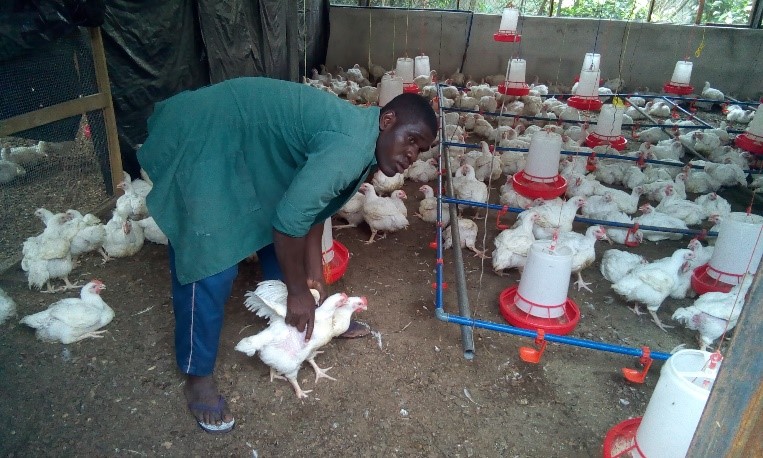
In line with its mandate to stimulate the establishment of youth-led agribusiness enterprise along commodity value chains, the Youth in Agribusiness Compact of Technologies for African Agricultural Transformation (TAAT) has launched its agribusiness park initiative.
The compact is linking youths who have undergone agribusiness incubation to business opportunities through the establishment of agribusiness parks.
Sponsored by the African Development Bank as part of its Feed Africa Initiative, TAAT’s main objective is to improve the business of agriculture across Africa by raising agricultural productivity, mitigating risks and promoting diversification and processing in 18 agricultural value chains within eight priority intervention areas.
The programme increases agricultural productivity through the deployment of proven and high-performance agricultural technologies at scale along selected nine commodity compacts such as cassava, Orange-fleshed sweet potato, aquaculture, small livestock, high iron beans, maize, rice, sorghum and millet, and wheat.
These work with six enabler compacts addressing transversal issues such as soil fertility management, water management, capacity development, policy support, attracting African youth in agribusiness and fall armyworm response.
Led by the International Institute of Tropical Agriculture (IITA), the compact, also known as ENABLE-TAAT (Empowering Novel Agribusiness-led Employment), provides capacity building and technical assistance for the establishment and expansion of youth-led agribusiness enterprises along TAAT value chains such as high iron beans, cassava, fish, maize, small livestock, rice and orange-fleshed sweet potato.
The compact’s mandate covers agribusiness completion, agribusiness incubation, youth advocacy and communication. Others are youth registration, and food basket outreach across six countries in Africa- DR Congo, Kenya, Nigeria, Tanzania, Uganda and Zambia.
The agribusiness park initiative brings together trained youths in clusters at various project locations to operate different enterprises in the same location. This grants them access to shared resources thereby saving cost and facilitating easier access to opportunities like loan packages, market linkages, continuous coaching and mentoring.
A dream come true for youths
The innovation is already yielding some results.
At one of the project sites in Onne, Rivers state in South-south Nigeria, the first batch of trained youths who are in cluster of four per group have established businesses on the technologies promoted by the TAAT Small Livestock and Aquaculture compacts.
The aquaculture cluster group stocked 1000 catfish juveniles while the poultry group also stocked 1000 day-old broiler chicks. The poultry structure and fish ponds are closely located; this further enhanced peer to peer learning and experience sharing between clusters.
A number of the trainees are already making the best of the technologies disseminated through the training and the opportunities that have been made available to them.
Lateef Oderemi is one of the youths.
After participating in the poultry training, Lateef stocked 1200 day-old pullets with equity funds. While his poultry structure was ongoing, he brooded the pullets in the sitting room of an available building. He’s receiving technical backstopping and monitoring to ensure a hitch-free production cycle.
Although Lateef is an Engineer, he has always had a passion for agriculture. The major concern for him wasnt financial resources, but limited technical know-how.
He sees the ENABLE TAAT agribusiness park initiative as an opportunity to actualize his dreams of setting up a large-scale poultry farm.
Fresh passion for agriculture
For another beneficiary, Obarijima Onyomi, a member of the poultry cluster and a married woman, the major concern was the need to provide the best for her household.
Aside the incubation activity, she was inspired by the ENABLE TAAT program to start a business that offers advisory services to poultry farmers and also serve as a bulking agent for poultry products.
Before the incubation program, Obarijima was completely new to agribusiness. Now her passion about agriculture with interest in poultry and fish farming has been ignited. She was mentored to apply for the Tony Elemelu Foundation fund – TEF Connect 2020.
“I am forever grateful to the ENABLE-TAAT platform for the training and for linking me to funding platforms I was not aware were in existence before now,” Obarijima said.
Francis Pollyn, another beneficiary is now experiencing significant increase in profit in his existing fish processing business after adopting TAAT technologies. Before now, Francis was engaged in fish smoking but the training by ENABLE TAAT has enhanced his branding, marketing, and pricing as well as processing methods to a certifiable standard.
ENABLE-TAAT activities in Onne has further exposed young people to agribusiness opportunities in neighbouring South-East Nigerian states namely Ebonyi, Anambra, Abia, and other Niger Delta states such as Akwa Ibom and Delta.

